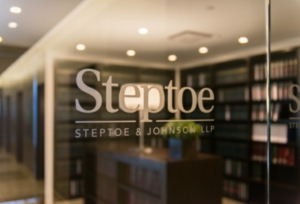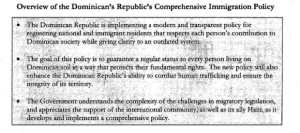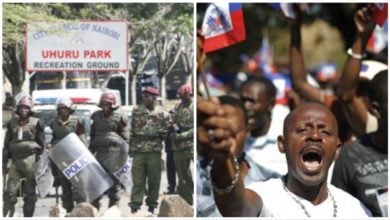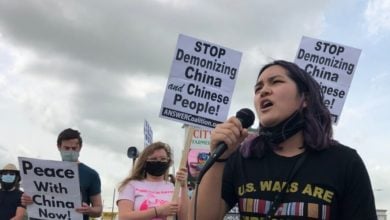
In September 2013, the Dominican Republic’s Constitutional Court ruled that those born to undocumented foreigners would not be able to maintain citizenship, mainly impacting Dominicans of Haitian descent. The deadline to formalize one’s legal status passed in June, with many thousands left unable to do so because of a lack of documentation. Already nearly 40,000 have “voluntarily” self-deported to Haiti, fearing a looming crackdown in the country many of them have never left. At a meeting of the Organization of American States on July 8, Haitian Foreign Minister Lener Renauld accused the Dominicans of leaving Haitians at the border “like dogs.”

But just three months after the court’s ruling, before the world’s attention turned to the island of Hispaniola and the humanitarian crisis on the border, the Dominican Republic hired a D.C.-based lobbying firm to assist with “consolidating and strengthening the image of the Dominican State in the eyes of the [sic] international public opinion,” according to documents filed as part of the Foreign Agents Registration Act.

The documents show that the Dominican Republic paid the lobbying firm Steptoe & Johnson over $820,000 between January and August of 2014. The relationship appears to be ongoing, however, and it is likely that those costs have only increased with the spotlight now firmly on the Dominican Republic and the firm bringing in hourly rates of around $1,000.
Lobbyists for Steptoe & Johnson distributed copies of talking points to congressional and executive offices, describing the migration policy as “modern and transparent” and as a means of protecting the “fundamental rights” of everyone living in the Dominican Republic. Between January and May 2014, the lobbyists met with the offices of at least 24 members of Congress, including key players on the foreign affairs committee. In addition to interactions with Congress, the contract between the Dominican Republic and Steptoe & Johnson describes a number of other actions, including placement of “interviews, features, opinion pieces in U.S. mainstream media.”
At the OAS meeting on July 8, Haiti asked for international support in coming to a solution to the crisis. A mission from the OAS is set to travel to Hispaniola this weekend. While other Caribbean nations have been vocal in defense of Haiti and have criticized the Dominican Republic’s actions, much of the rest of the hemisphere has remained on the sidelines. The U.S., noted that it was “monitoring the situation closely” and providing funding to civil society groups working in the border area. In private meetings, U.S. officials have stated that their silence is not an indication of how serious they are taking this, but they have preferred to work behind the scenes with the two countries so far.
At the meeting, the Dominican Republic’s representative to the OAS accused Haiti of leading a “misinformation campaign” designed to hide the facts. But while he said there were no deportations currently happening, Wade McMullen, an attorney at the Robert F. Kennedy Center for Justice & Human Rights, told the Miami Herald that, “Deportations, forcible removals are happening on a consistent and ongoing basis. … None of the things the Dominican government said they were going to do …are happening.” The lobbying contract also notes that Steptoe & Johnson is responsible for “writing of texts” for press releases, speeches and “arguments.”
Who’s really running the misinformation campaign? And how much is it costing?






